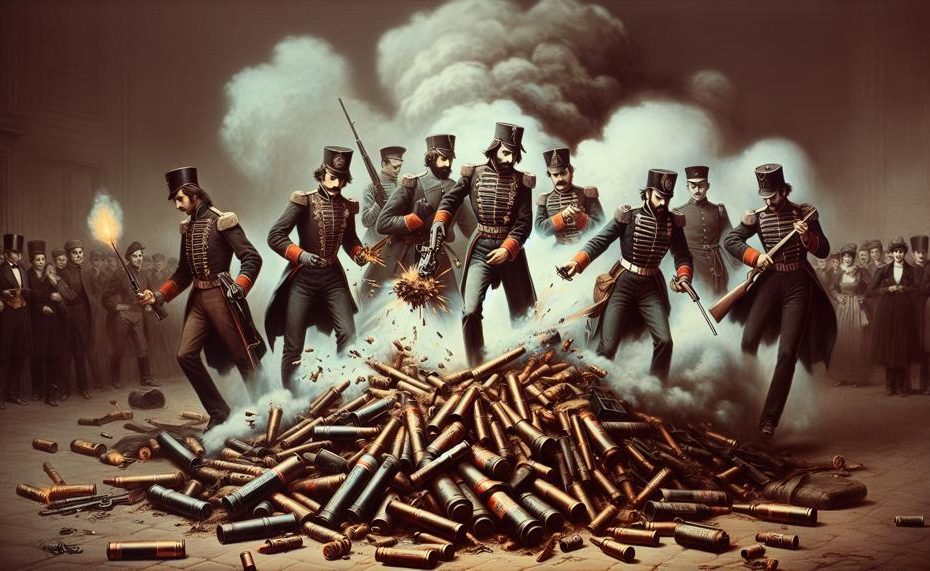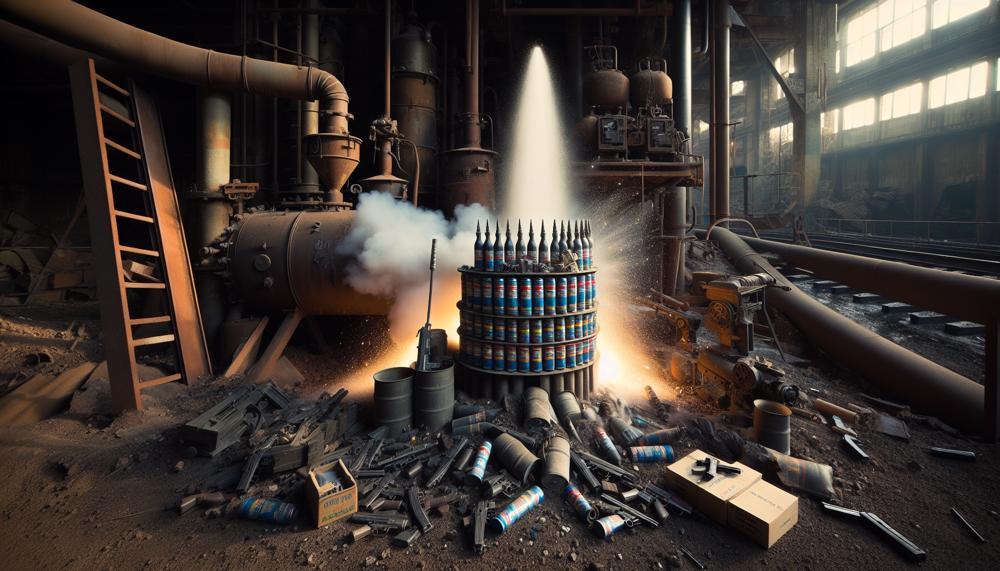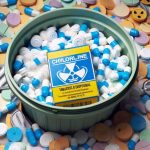Are you a gun enthusiast or someone who regularly handles firearms? If so, you understand the importance of responsible gun ownership and safe handling. Have you ever thought about what happens to the leftover gunpowder after you’re done shooting?
Improper disposal of this highly explosive substance can have serious consequences. It can harm both your safety and the environment.
That’s why we’re here to share essential tips for safely disposing of gunpowder.
First and foremost, never pour gunpowder down the drain or throw it in the trash. This can lead to fires and explosions, putting yourself and others at risk. Instead, follow these guidelines:
- Avoid stockpiling large quantities of gunpowder – only keep what is necessary for immediate use.
- If possible, use up all your gunpowder before disposing of it.
- For small amounts, burning it in a controlled outdoor setting is the safest option.
- For larger quantities, contact your local hazardous waste facility for proper disposal methods.
- Always wear protective gear such as gloves and goggles when handling gunpowder.
- Keep children and pets away from the disposal area.
Remember, proper disposal not only ensures your safety but also protects our environment.
Let’s do our part in keeping ourselves and our surroundings safe from potential harm.
Contents
What is Gunpowder, Anyway?
Gunpowder is a combination of sulfur, carbon (charcoal), and potassium nitrate (saltpeter).
These components act as fuels and oxidizers. They allow for a quick chemical reaction when lit. This process is known as deflagration. It releases a significant amount of hot gas that propels bullets from firearms.
| Sulfur | Carbon (charcoal) | Potassium Nitrate (saltpeter) |
| Acts as an oxidizer in the mixture | Acts as a fuel in the mixture | Acts as an oxidizer in the mixture |
| Allows for a rapid chemical reaction when ignited | Rapidly burns and produces heat and gas | Supplies oxygen for the combustion process |
There are two primary types of gunpowder: black powder and smokeless powder. Black powder, also known as gunpowder, is the earliest known chemical explosive. It is primarily used in firearms with a matchlock, flintlock, or percussion cap ignition system. Smokeless powder is a more modern type of gunpowder. It is commonly found in modern firearms and ammunition.
You can safely dispose of black powder by mixing it with damp dirt. You can also hand it over to the police or a licensed gun dealer.
On the other hand, smokeless powder can be safely disposed of in several ways. You can burn it outdoors with caution. You can use it as fertilizer. You can give it to someone who reloads ammunition. Or, you can trade it online.
It is essential to handle gunpowder with caution. Store it properly to prevent deterioration and potential danger. Gunpowder releases a large amount of hot gas when ignited. This happens due to its rapid chemical breakdown. If not handled correctly, it can be dangerous, which is why it is crucial to dispose of it properly.
Ways To Dispose Of Gunpowder
Various methods are available for safe and creative disposal of gunpowder. The method to use depends on the type and quantity. It is crucial to properly handle and store gunpowder to prevent potential hazards.
Seek Assistance from the Police or a Licensed Gun Dealer
Contacting your local police department or a certified gun dealer is one of the simplest and safest ways to dispose of gunpowder.
They possess the necessary expertise and equipment to handle and dispose of gunpowder in a secure manner.
Combine with Moist Soil
For small quantities of black powder, it can be safely disposed of by mixing it with moist soil.
This will render the gunpowder inactive and suitable for disposal in the trash. However, it is important to note that black powder can become permanently damaged when exposed to water. Saltpeter absorbs water.
Burn Smokeless Powder
Small amounts of smokeless powder can be disposed of safely by burning it outdoors.
Be sure to take necessary precautions and adhere to local fire codes. Larger quantities should be left for professionals from the bomb squad to handle.
Utilize as Fertilizer
Smokeless powder can also serve as a fertilizer for plants due to its high nitrogen content.
This is a creative way to dispose of it while also providing nutrients for your garden.
Give It Away
If you know someone who reloads their own ammunition, you can give them your excess smokeless powder.
This not only helps with disposal but also saves them money on purchasing new powder.
Trade Online
There are websites and forums specifically for trading or selling gunpowder online.
Ensure that you follow all safety guidelines and laws when participating in such activities.
Attend a Disposal Event
Some areas host disposal events where residents can bring in hazardous materials, including gunpowder, for appropriate disposal.
Check with your local government for any upcoming events.
What Happens To Gunpowder When It Gets Wet?
Water can greatly affect the stability and proper disposal of gunpowder. When gunpowder becomes wet, it can clump together and lose its explosive properties.
This is because potassium nitrate is a key component of gunpowder. It has a hygroscopic nature that makes it prone to absorbing moisture from the air. It dissolves when exposed to water. As a result, the effectiveness of gunpowder is compromised, posing potential dangers.
Various factors, such as temperature and humidity, can influence the degree of damage caused by wet gunpowder. Higher moisture levels can cause more severe clumping and dissolution. This makes it hard for gunpowder to burn evenly. This poses a significant safety risk for those handling firearms.
Properly dispose of wet gunpowder with caution. Follow local laws and regulations. It should never be flushed down the toilet or poured down the drain. This can harm the environment and put others at risk.
In case gunpowder does become wet, it should be spread out and allowed to air dry naturally in a cool, dry place. Using heat sources to dry it can be hazardous.
In situations with heavy exposure or significant damage, dispose of gunpowder through appropriate channels. Contact local authorities or hazardous waste management facilities.
Does Water Ruin Gunpowder?
The answer is no. Using water to get rid of gunpowder is not only ineffective but also dangerous. Water has the ability to destroy gunpowder, causing it to lose its explosive properties and rendering it useless. To prevent accidents and maintain the potency of gunpowder, it is crucial to follow proper disposal methods.
There are various ways to dispose of gunpowder safely, depending on the amount that needs to be disposed of. For small amounts, it is best to burn the gunpowder in a controlled environment, such as a fire pit or burn barrel. This should only be done by someone experienced in handling explosives.
For larger amounts, it is recommended to contact your local bomb squad or hazardous waste disposal team. They have the expertise and equipment to handle the disposal safely and effectively. It’s important not to attempt to dispose of large amounts of gunpowder on your own. It can be extremely dangerous.
Can You Burn Gunpowder?
| Can Gunpowder Burn? | Explanation |
|---|---|
| Yes | Gunpowder is a combustible mixture of sulfur, charcoal, and potassium nitrate. When ignited, it undergoes a rapid chemical reaction, producing large volumes of hot gases that can propel a projectile from a firearm. |
| Requires Confinement | To burn efficiently and produce the desired propulsive force, gunpowder needs to be confined within a chamber or barrel. This confinement allows the pressure from the expanding gases to build up, driving the projectile forward. |
| Oxygen Independence | Unlike other fuels that require atmospheric oxygen for combustion, gunpowder contains its own oxidizer in the form of potassium nitrate. This allows it to burn even in the absence of air, making it suitable for use in firearms and other applications where a controlled and rapid release of energy is desired. |
| Rapid and Controlled Burn | The chemical reaction in gunpowder is designed to burn quickly and produce a large volume of gases in a short period of time. This rapid burning rate is essential for propelling projectiles from firearms with high velocity and accuracy. |
| Versatility | Gunpowder has been used for centuries in various applications, including firearms, fireworks, and mining. Its versatility stems from its ability to produce a controlled and powerful explosion, making it a valuable tool in various industries and activities. |
How Long Does Old Gunpowder Last?
There are several obvious indicators. They can help you determine if your gunpowder has exceeded its shelf life and needs safe disposal. These include a pungent odor similar to vinegar, a reddish hue, and a coarse texture.
If you notice any of these signs, it is strongly recommended to take immediate action. Properly dispose of the gunpowder to prevent potential hazards.
Furthermore, if your gunpowder has been stored for an extended period of time or has been exposed to extreme temperatures or moisture, it is likely no longer safe for use or disposal without professional assistance.
| Gunpowder Type | Safety Precautions |
| Smokeless Powder | Small amounts can be safely burned in a controlled environment using a fuse. However, it should not be burned in large quantities or enclosed spaces. Alternatively, it can also be used as fertilizer when mixed with soil. |
| Black Powder | Flushing down the toilet is not recommended. Instead, it can be taken to a shooting range or mixed with damp soil until it becomes inert. |
Does Gunpowder Deteriorate?
The degradation of gunpowder not only impacts its performance but also presents a safety hazard. Gunpowder can become unstable and potentially explosive when it degrades. This underscores the importance of proper disposal.
If left unattended, old or unwanted gunpowder can pose a threat to individuals and the environment.
Effects of Deterioration on Safe Disposal
Different types of gunpowder can deteriorate in various ways. Smokeless gunpowder, also known as propellant powder, is the most commonly used type in modern firearms. It can degrade over time due to exposure to heat, moisture, or improper storage.
Smokeless gunpowder deteriorates, making it more sensitive to shock or friction. This increases the risk of accidental explosions.
Black powder, also known as gunpowder or black blasting powder, is an older form of gunpowder. It is still used in antique firearms and pyrotechnics.
Black powder contains potassium nitrate, sulfur, and charcoal. These can combine with moisture to form a corrosive substance. It can damage its container or cause self-ignition. As black powder deteriorates, it becomes increasingly dangerous to handle and dispose of.
Safe Disposal Methods
The safest way to dispose of old or unwanted gunpowder is by contacting your local police department or bomb disposal team. These trained professionals have the knowledge and equipment to safely dispose of gunpowder. They do so without causing harm to themselves or others. They may also use disposed gunpowder for training purposes.
Another option is to sell or give away the gunpowder. This could be done to responsible individuals who have proper knowledge and experience in handling it. Ammunition enthusiasts or gun owners may be interested in taking it off your hands.
If you need to dispose of the gunpowder yourself, it is crucial to understand its properties and follow safety precautions. Small amounts of smokeless gunpowder can be safely burned in a controlled environment. Black powder should be mixed with damp dirt or taken to a waste facility. Never flush large amounts of gunpowder down the toilet. It can contaminate water supplies and pose health risks.
Signs of Deterioration
It’s critical to dispose of deteriorated gunpowder properly. It can become unstable and dangerous. Indicators of deterioration include a sour vinegar smell and a change in color, often appearing red. If you detect these signs in your gunpowder, handle it with caution and dispose of it immediately.
In conclusion, the degradation of gunpowder can impact its safe disposal, making it essential to properly dispose of old or unwanted gunpowder to prevent potential hazards.
What Causes Gunpowder To Explode?
Gunpowder’s explosive nature results from a perfectly balanced combination of potassium nitrate, charcoal, and sulfur. Each ingredient plays an essential role in the violent reaction that occurs when ignited.
Potassium nitrate acts as the oxidizing agent, providing the necessary oxygen for combustion to take place. Its presence allows for a rapid release of energy, resulting in a powerful explosion.
On the other hand, charcoal serves as the fuel in gunpowder, producing intense heat and gases that rapidly expand and create a forceful blast. Its contribution to the explosive reaction cannot be underestimated.
Lastly, sulfur acts as a catalyst, accelerating the burning process. It significantly lowers the ignition temperature.
This allows for the explosive reaction to occur more quickly. Sulfur is a key ingredient in gunpowder.
Conclusion
In conclusion, being a responsible gun owner means not only safely handling firearms. It also means properly disposing of leftover gunpowder.
Failing to do so can have serious consequences for both safety and the environment. It’s crucial to avoid stockpiling large amounts of gunpowder. Instead, use up what’s necessary before disposal.
The safest method is burning small quantities in a controlled outdoor setting. Professionals at a hazardous waste facility should handle larger amounts. Always remember to wear protective gear when handling gunpowder. Keep children and pets away from the disposal area.
By disposing of gunpowder properly, we ensure our safety. We also protect our surroundings from potential harm.






